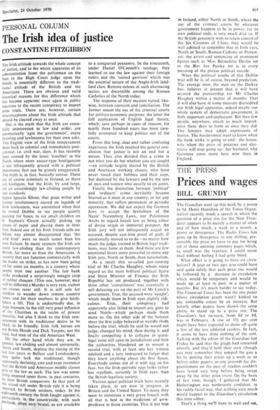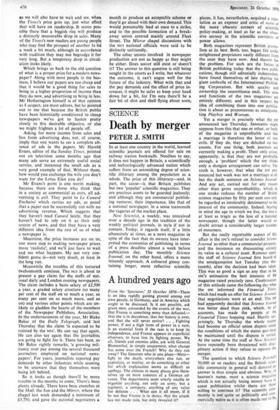THE PRESS
Prices and wages
BILL GRUNDY
The Guardian went up this week by a penny to 9d. Denis Hamilton of the Times Organ- isation recently made a speech in which the question of a price rise for the New Thun- derer appears to be merely a matter of when and of how much, a week or a month, a penny or threepence. The Radio Times has gone up by threepence to one shilling, pre- sumably the price we have to pay for being rid of those opening summary pages which, so small was the typeface. I could never read without feeling 1 had gone blind.
What effect is it going to have on circu-* lations? A year or two ago, you could have said quite safely that each price rise would be followed by a decrease in circulation which would be temporary and would be made up, at least in part, in a matter of months. But it's much harder to say today. The Financial Times has been the one paper whose circulation graph wasn't kinked to any noticeable extent by an increase. But latterly other papers have shown the same ability to stand up to a price rise. The Guardian's last increase, from 6d to 8d, was in February. A rise of 331 per cent might have been expected to shake off quite a few of the less addicted readers. In fact, it seems to have done nothing of the sort. Talking with the editor of the Guardian last Friday he said that the graph had remained smooth, and they'd held their own (though you may remember they jumped the gun a bit by putting their prices up a week or so before other papers, so any grounds for dis- gruntlement on the part of readers couldn't have lasted very long before being swept away by the other price rises). On the basis of last time, though, I gathered that Mr Hetherington, was moderately confident, in his ruddy-faced way, that nothing very much would happen to the Guardian's circulation this time tither.
That's a thing well have to wait and see, as we will also have to wait and see, when the Times's price goes up, just what effect that will have on readership. It seems pose sible there that a biggish rise will produce a distinctly measurable drop in sales. Many of the Times's new readers are young people who may find the prospect of another is 6d a week a bit much, although in accordance with tradition they may not begrudge it for very long. But a temporary drop in circul- ation looks likely.
Which brings us back to the old question of what is a proper price for a modern newsy paper? Along with most people in the buss iness, I believe our papers are too cheap and that it would be a good thing for sales to bring in a higher proportion of income than they do now, and advertising to bring in less. Mr Hetherington himself is of that opinion as I suspect, are most editors, but he pointed out to me that because the British public have been historically conditioned to cheap newspapers we've got to hasten pretty slowly to this desirable objective, or else we might frighten a lot of people off.
Asking for more income from sales and less from advertising does not, of course, imply that one wants to see a complete ab- sence of ads in the papers. Mr Harold Evans, editor of the Sunday Times, pointed out on television some months ago that many ads serve an extremely useful social service, and instanced the small ads as a very good example of that. Without them, how would you exchange the wife you don't want for the Lotus Elan you do?
Mr Evans's point is one worth making, because there are those who think that in a society as commercial as ours, all ad- vertising is evil. They point to Le Canard Enchaine which carries no ads, as proof that a paper can be successfully run with no advertising revenue. Which suggests that they haven't read Canard lately, that they haven't had to rely on it as their only source of news, and that they have a very different idea from the rest of us of what a newspaper is.
Meantime, the price increases are on us, one more step to making newspaper prices more 'realistic', and we'll just have to wait and see what happens. My not very con- -Went guess, is—not very much, at least in the long run.
Meanwhile the troubles of this tortured twelvemonth continue. The NUJ is about to present a pay claim for the staffs of nat- ional daily and London evening newspapers. The claim includes a basic salary of £2,500 a year, a graded salary structure (so many per cent of the staff on so much a year, so many per cent on so much more, and so on) and various other points which are un- likely to gladden the hearts of the members
of the Newspaper Publishers Association. In the understatement of the year, Mr Blake Baker of the Daily Telegraph, said last
Thursday that the claim 'is expected to be resisted by the NPA'. He can say that again.
He can also say again that the journalists
are going to fight for it. There his been, as Mr Baker rightly remarks, 'a growing mil-
itancy over pay among the several thousand journalists employed on national news- papers'. For years, journalists reported pay demands by other industries while seeming to be unaware that they themselves were being left behind.
So it looks as though there'll be more trouble in the months to come. There's been
plenty already. There have been crunches at the Mail, the Sun and the Mirror, where the chapel last week demanded a minimum of £3,750, and gave the national negotiators a month to produce an acceptable scheme or they'd go ahead with their own demand. This would presumably lead at once to a strike, and to the possible formation of a breakq away union centred mainly around Fleet Street. The Mirror chapel discussions with the NUJ national officials were said to be distinctly unfriendly.
The other unions involved in newspaper production are not as happy as they might be either. Does SOGAT still exist or doesn't it? The answer to this question is still being sought in the courts as I write, but whatever the outcome, it can't augur well for the future of the industry. What with that and the pay demands and the effect of price in- creases, it might be safer to keep your head down for a bit, for I'm sure there'll be a fair bit of shot and shell flying about sooni















































 Previous page
Previous page